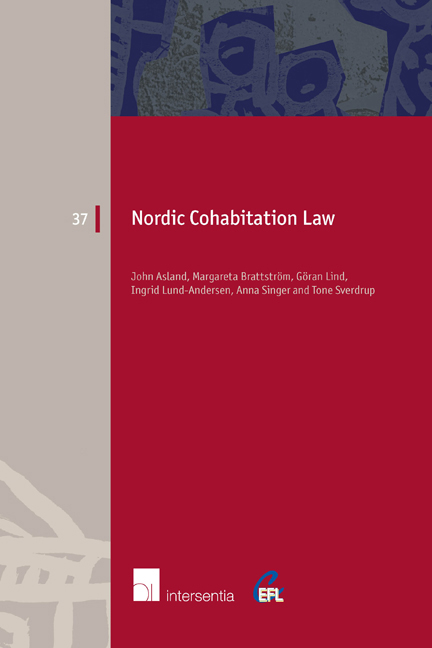Book contents
- Frontmatter
- Preface
- Contents
- Table of Cases
- List of Abbreviations
- Chapter 1 The Development of Cohabitation and Cohabitation Law in the Nordic Countries
- Chapter 2 Property Issues in Cohabitation Relationships
- Chapter 3 Financial Settlements on Termination of Cohabitation
- Chapter 4 The Legal Position of the Surviving Cohabitant
- Chapter 5 The Relevance of Cohabitation for Parental Rights
- Chapter 6 The Distinctive Legal Nature of Cohabitation Relationships and the Need for Legislation
- Chapter 7 Discussion of Legal Policy: Principles for Regulating Cohabitation Relationships
- References
- About the Authors
- European Family Law Series
Chapter 6 - The Distinctive Legal Nature of Cohabitation Relationships and the Need for Legislation
Published online by Cambridge University Press: 13 December 2017
- Frontmatter
- Preface
- Contents
- Table of Cases
- List of Abbreviations
- Chapter 1 The Development of Cohabitation and Cohabitation Law in the Nordic Countries
- Chapter 2 Property Issues in Cohabitation Relationships
- Chapter 3 Financial Settlements on Termination of Cohabitation
- Chapter 4 The Legal Position of the Surviving Cohabitant
- Chapter 5 The Relevance of Cohabitation for Parental Rights
- Chapter 6 The Distinctive Legal Nature of Cohabitation Relationships and the Need for Legislation
- Chapter 7 Discussion of Legal Policy: Principles for Regulating Cohabitation Relationships
- References
- About the Authors
- European Family Law Series
Summary
POINT OF DEPARTURE
The Nordic countries have long pursued a policy of equalising the differences between women and men in working life. This gender equality policy has been successful in many areas. The combination of high labour force participation by women and a relatively high fertility rate is characteristic of the Nordic countries. The life-long full-time housewife is virtually a thing of the past, and fathers have increased the part they play in looking after children and in house work. Full equality is still a long way off, however. On average just under 40 per cent of working-age women in the Nordic countries work part-time, while only a small percentage of men do. Women still spend more time undertaking childcare than men, although the difference is less pronounced than before.
Unequal asset accumulation: An unequal distribution of work may easily translate into an unequal accumulation of assets during a cohabitation relationship. The person who undertakes more than their share of the family's ‘unprofitable tasks’, i.e. childcare and the meeting of living expenses, often risks being left without any capital assets, even after a long period of cohabitation. The two cohabitants’ total work input at home and outside may be equal at any given point in time, but the differences are generated over time in that the first partner's work input vanishes (it is consumed), while the other's endures.
In Sweden some housing assets may be divided when a relationship terminates, but in the other Nordic countries the financial settlement is based on property law, with some room left for awards of compensation; see Chapters 2 and 3. In Norway, cohabitants who have children together also enjoy a right to inherit from one another and to assume undivided possession of the estate; see Chapter 4. A settlement based on property law may lead to one cohabitant being left with most of the assets on termination of even a long-term relationship. It is difficult to know how widely this occurs, but an unequal division of expenses and work is typical of the many judgments we have seen addressing settlements following cohabitation relationships.
- Type
- Chapter
- Information
- Nordic Cohabitation Law , pp. 241 - 266Publisher: IntersentiaPrint publication year: 2015



